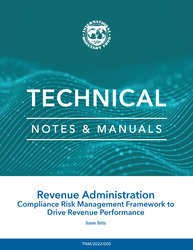
Revenue Administration: Compliance Risk Management: Overarching Framework to Drive Revenue Performance
Revenue Administration: Compliance Risk Management: Overarching Framework to Drive Revenue Performance
READ MORE...
Volume/Issue:
Volume 2022
Issue 005
Publication date: August 2022
ISBN: 9798400215216
$5.00
Add to Cart by clicking price of the language and format you'd like to purchase
Available Languages and Formats
| English |
Prices in red indicate formats that are not yet available but are forthcoming.
Topics covered in this book
This title contains information about the following subjects.
Click on a subject if you would like to see other titles with the same subjects.
Economics- Macroeconomics , Public Finance , Taxation - General , International Taxation , CRM framework , CRM process , CRM activity , framework to drive revenue performance , compliance risk , Tax administration core functions , Compliance risk management , Revenue mobilization , Compliance improvement plans
Summary
This technical note describes CRM at a high level and how tax administrations can implement a CRM framework to significantly strengthen revenue outcomes. A tax administration’s primary role is to collect revenues on behalf of government to fund the country’s social and economic goals. Taxpayers are expected to comply with their tax obligations as stated in the law. Compliance is the degree to which taxpayers meet their obligations, whether voluntarily or through efforts by the tax administration to enforce compliance. Using CRM allows a country to optimize its revenue collection by identifying and focusing resources on the highest risks to the tax base. While the concepts of CRM are transferable to the customs context, this note focuses on tax administration compliance risks.
Copyright © 2010 - 2026
Powered by:
AIDC



